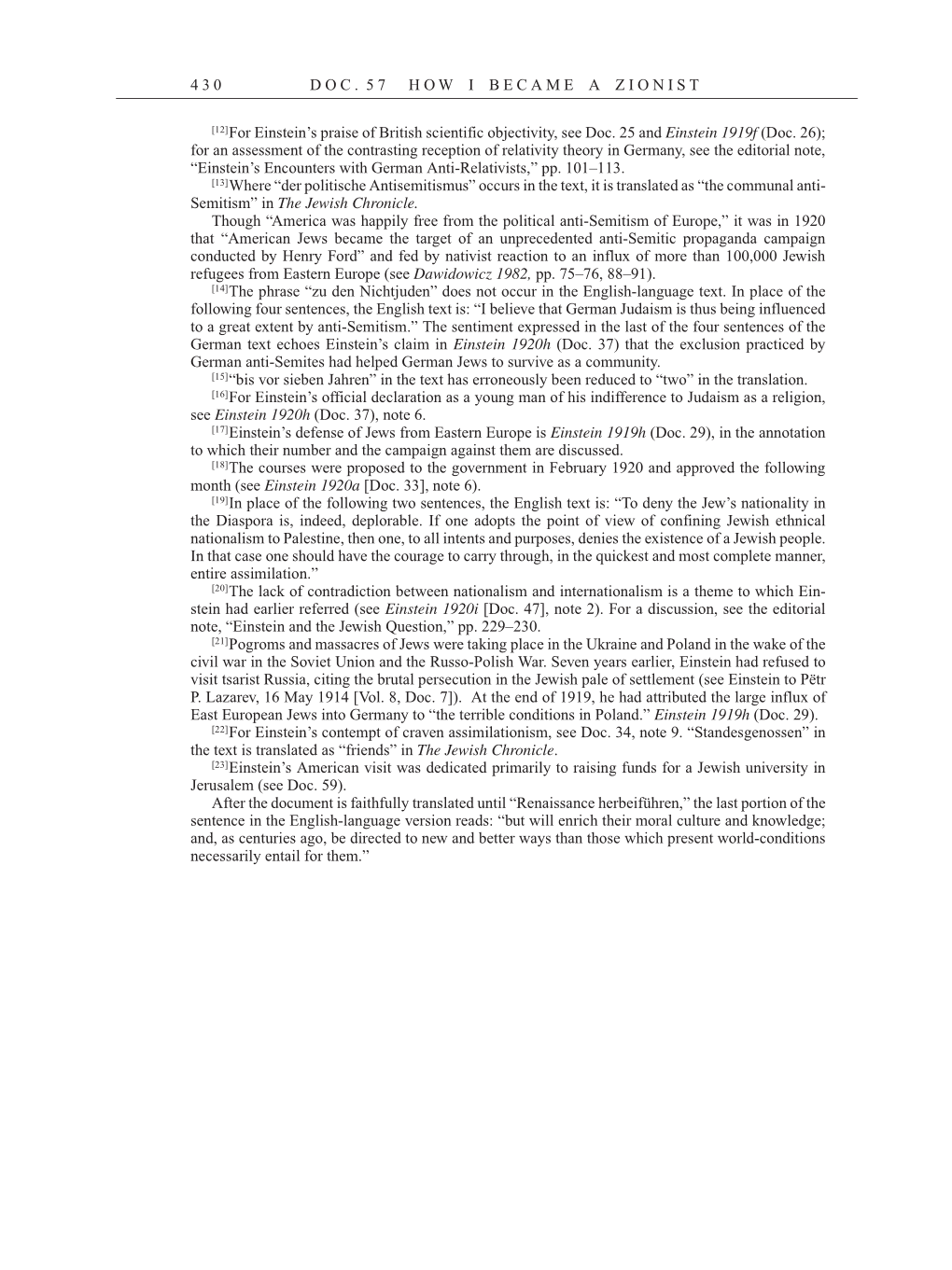4 3 0 D O C . 5 7 H O W I B E C A M E A Z I O N I S T
[12]For Einstein’s praise of British scientific objectivity, see Doc. 25 and Einstein 1919f (Doc. 26);
for an assessment of the contrasting reception of relativity theory in Germany, see the editorial note,
“Einstein’s Encounters with German Anti-Relativists,” pp. 101–113.
[13]Where “der politische Antisemitismus” occurs in the text, it is translated as “the communal anti-
Semitism” in The Jewish Chronicle.
Though “America was happily free from the political anti-Semitism of Europe,” it was in 1920
that “American Jews became the target of an unprecedented anti-Semitic propaganda campaign
conducted by Henry Ford” and fed by nativist reaction to an influx of more than 100,000 Jewish
refugees from Eastern Europe (see Dawidowicz 1982, pp. 75–76, 88–91).
[14]The phrase “zu den Nichtjuden” does not occur in the English-language text. In place of the
following four sentences, the English text is: “I believe that German Judaism is thus being influenced
to a great extent by anti-Semitism.” The sentiment expressed in the last of the four sentences of the
German text echoes Einstein’s claim in Einstein 1920h (Doc. 37) that the exclusion practiced by
German anti-Semites had helped German Jews to survive as a community.
[15]“bis vor sieben Jahren” in the text has erroneously been reduced to “two” in the translation.
[16]For Einstein’s official declaration as a young man of his indifference to Judaism as a religion,
see Einstein 1920h (Doc. 37), note 6.
[17]Einstein’s defense of Jews from Eastern Europe is Einstein 1919h (Doc. 29), in the annotation
to which their number and the campaign against them are discussed.
[18]The courses were proposed to the government in February 1920 and approved the following
month (see Einstein 1920a [Doc. 33], note 6).
[19]In place of the following two sentences, the English text is: “To deny the Jew’s nationality in
the Diaspora is, indeed, deplorable. If one adopts the point of view of confining Jewish ethnical
nationalism to Palestine, then one, to all intents and purposes, denies the existence of a Jewish people.
In that case one should have the courage to carry through, in the quickest and most complete manner,
entire assimilation.”
[20]The lack of contradiction between nationalism and internationalism is a theme to which Ein-
stein had earlier referred (see Einstein 1920i [Doc. 47], note 2). For a discussion, see the editorial
note, “Einstein and the Jewish Question,” pp. 229–230.
[21]Pogroms and massacres of Jews were taking place in the Ukraine and Poland in the wake of the
civil war in the Soviet Union and the Russo-Polish War. Seven years earlier, Einstein had refused to
visit tsarist Russia, citing the brutal persecution in the Jewish pale of settlement (see Einstein to Pëtr
P. Lazarev, 16 May 1914 [Vol. 8, Doc. 7]). At the end of 1919, he had attributed the large influx of
East European Jews into Germany to “the terrible conditions in Poland.” Einstein 1919h (Doc. 29).
[22]For Einstein’s contempt of craven assimilationism, see Doc. 34, note 9. “Standesgenossen” in
the text is translated as “friends” in The Jewish Chronicle.
[23]Einstein’s American visit was dedicated primarily to raising funds for a Jewish university in
Jerusalem (see Doc. 59).
After the document is faithfully translated until “Renaissance herbeiführen,” the last portion of the
sentence in the English-language version reads: “but will enrich their moral culture and knowledge;
and, as centuries ago, be directed to new and better ways than those which present world-conditions
necessarily entail for them.”
